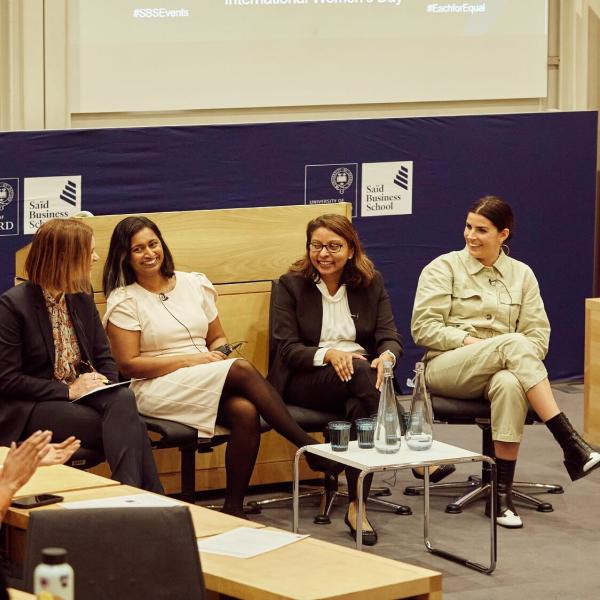About the event
International Women’s Day panel discussion explores the compromises and challenges of juggling personal lives and careers.
Women in senior roles are finding a variety of different ways to balance their personal and family lives with their professional lives – but it is still a challenging issue and there is no clear-cut answer that works for everyone.
Women leaders who spoke at a series of events at Oxford Saïd linked with International Women’s Day 2020 described how their husbands had stopped working to become their children’s primary care-givers, or how they employed a nanny and drew on a supportive circle of friends, or how they and their husbands took turns in being the ‘breadwinner’ so that they could both pursue personal or educational goals. Vivienne Cox, Vice-Chair of the Board at Oxford Saïd, said there is no such thing as work/life balance: ‘it’s all just life’.
However, as Fathima Hussain, MD of Oil and Gas Corporate Finance at Standard Chartered, observed during the Oxford Women’s Leadership Alliance panel discussion, compromises still need to be made. ‘You still need a supportive partner or family,’ she said. ‘And flexible working is all very well but I am basically still at my clients’ beck and call.’
Even the compromises are dependent on income – Charm Legrand, Vice President/Digital Partner at Genpact recalled realising that she would have to focus on increasing her income significantly if she was to support her husband while he took a year off work to pursue a creative goal – and on sector. An audience member during the panel discussion said that she used to ‘do great work’ for 60 or 70 hours a week as a project manager, ‘then I had my first child and went down to 40 or 50 hours a week and my career stopped’. And there are other organisations, in sectors including teaching and healthcare, which may be theoretically open to flexibility but nevertheless depend on employees always being present at certain times. As Hussain put it, ‘There are structural problems in organisations which mean that we can’t always juggle when we need to juggle’.
Occasionally it is possible to reset those structures. Cox, for example, was offered a key leadership role while on maternity leave and was invited to name her terms. However, such opportunities are very rare indeed. More often, as Legrand advised, individuals should try to find employers that are already willing to allow people to work from home or find other ways to organize their lives around work, family, and other interests and responsibilities: ‘You can judge the company culture and ask about policies around lifestyle. These are the things it is important to look out for during interviews.’
But is the danger that some organisations never change, and remain bastions of overworked men whose lives are dominated by work? An audience member asked the panel a hypothetical question: ‘If you were in an organisation where, as hard as you might work, you saw no way to the top, no female role-models, and no possibility of flexibility, would you stay or would you go?’ Holly Brooker, Head of Marketing UK/I at ClassPass, declared that she would stay and battle her way through. But the other two, after a moment’s equivocation, were clear. They would go.
